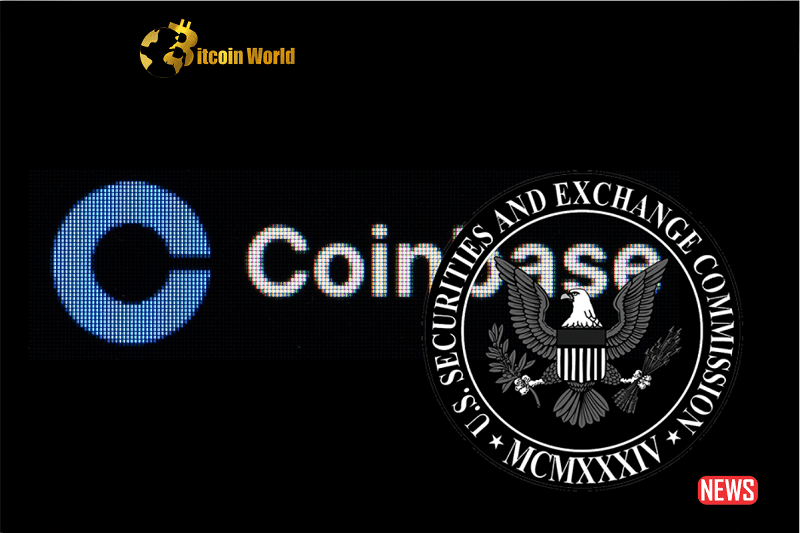The crypto world is buzzing, and at the heart of it is a showdown between one of its biggest players, Coinbase, and the ever-watchful Securities and Exchange Commission (SEC). Think of it as a high-stakes chess match where the future of decentralized finance (DeFi) hangs in the balance. Ready to dive into the details?
Why is Everyone Talking About the SEC’s Proposed Rule Change?
The SEC isn’t just sitting on the sidelines; they’re looking to redefine what constitutes an “exchange.” This might sound technical, but it has huge implications for the crypto space. Imagine the rulebook suddenly changing mid-game. That’s kind of what’s happening here. The SEC wants to broaden its definition to include DeFi platforms and cryptocurrencies, a move that has sparked significant pushback from the industry.
What’s Got Crypto Companies So Worried?
- Broader Scope, Broader Regulation: A wider definition means more crypto platforms could fall under the SEC’s regulatory umbrella, potentially leading to stricter compliance requirements.
- Impact on DeFi: The decentralized nature of DeFi exchanges (DEXs) makes them fundamentally different from traditional exchanges. Applying the same rules could stifle innovation.
- Unintended Consequences: Many worry that the SEC’s approach could force crypto businesses to centralize, halt operations, or even leave the U.S.
Coinbase Steps Up: Taking a Stand Against the SEC
Coinbase isn’t one to back down from a challenge. They’ve been vocal in their opposition to the SEC’s proposed changes, and things really heated up when the SEC filed a lawsuit against them. The accusation? Operating as an unregistered exchange and offering unregistered securities. Ouch!
Coinbase’s Counter-Argument: What’s Their Angle?
Coinbase fired back with a letter to the SEC, referencing Supreme Court rulings and arguing that the agency can’t just ban an entire industry without clear authorization from Congress. Think of it as saying, “Hey, you can’t just make up the rules as you go!”
The DeFi Dilemma: Can Traditional Rules Apply?
This is where things get really interesting. Decentralized exchanges (DEXs) operate differently. Let’s break it down:
How Do DEXs Actually Work?
- Code is King: Software developers create the code and release it on a public blockchain.
- Governance Tokens: These tokens give holders the power to influence certain aspects of the DEX.
- Decentralized Control: Unlike traditional exchanges, there isn’t a central authority running the show.
Coinbase argues that the SEC’s proposed rules simply don’t fit the decentralized nature of DEXs. Imagine trying to fit a square peg into a round hole – it’s just not going to work smoothly.
Who Else is Joining the Fight?
Coinbase isn’t alone in this battle. Several other key players in the crypto space have voiced their concerns:
The Chorus of Criticism:
- The Blockchain Association: They’ve raised concerns about the lack of clarity in the proposed rule changes.
- DeFi Education Fund (DEF): They believe the rules could force crypto businesses to centralize or leave the U.S.
- Paradigm: They highlight the fact that many DEXs operate without intermediaries, using algorithms for transactions.
- Republican Members of the House Financial Services Committee: They’ve called for the withdrawal of the proposal.
Even Tavonia Evans from the National Policy Network of Women in Color in Blockchain is urging the SEC to clarify how these rules would apply to DEXs that don’t handle fiat currency. It’s a broad spectrum of voices all asking for more clarity and a more tailored approach.
What Are the Key Concerns?
Beyond the immediate impact on businesses, there are deeper concerns about the SEC’s approach:
The Red Flags Raised by the Industry:
- Lack of Clarity: The proposed rules are seen as vague, leaving uncertainty about which activities are covered.
- Economic Analysis Needed: Critics argue that the SEC hasn’t adequately analyzed the economic impact of these changes.
- Insufficient Industry Engagement: Many feel the SEC hasn’t properly consulted with the crypto industry.
- Jurisdictional Overreach: Questions are being raised about whether the SEC has the legal authority to regulate DeFi in this way.
Looking Ahead: What Does This Mean for the Future of Crypto?
Coinbase’s challenge to the SEC is more than just a legal spat; it’s a reflection of the broader tension between innovation and regulation in the crypto world. It highlights the need for a regulatory framework that is both effective and adaptable to the unique characteristics of decentralized technologies.
Key Takeaways:
- The SEC’s attempt to broaden the definition of an “exchange” is facing significant resistance from the crypto industry.
- Coinbase is at the forefront of this challenge, both through public statements and a formal legal challenge.
- The debate centers on whether traditional financial regulations can be effectively applied to decentralized technologies like DeFi.
- Many stakeholders are calling for clearer guidance, more thorough analysis, and greater collaboration between regulators and the industry.
The outcome of this clash will likely shape the future of cryptocurrency regulation in the United States. Will the SEC’s approach stifle innovation, or will it provide a necessary framework for responsible growth? The world is watching closely as this regulatory drama unfolds.
Disclaimer: The information provided is not trading advice, Bitcoinworld.co.in holds no liability for any investments made based on the information provided on this page. We strongly recommend independent research and/or consultation with a qualified professional before making any investment decisions.


